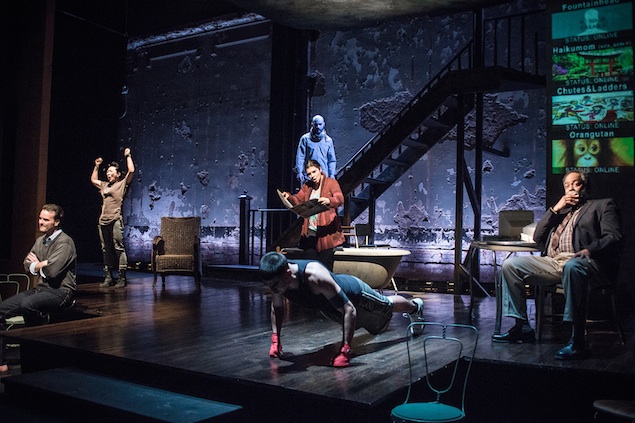
According to one of the characters in Water By the Spoonful, after a while addiction is “less about getting high and more about trying to build a time machine.” That sense of trying to get back to something familiar while moving inexorably forward pervades Quiara Alegría Hudes’s intriguing and subtle play, the middle work in a trilogy focusing on a discharged Marine trying to reconcile his rocky past with an uncertain future.
Each play in Hudes’s series is supposedly inspired by music. In Elliot, a Soldier’s Fugue, which debuted in 2006 and was a Pulitzer finalist, a Korean War veteran (and the grandfather to the above aforementioned Marine, Elliot) describes how Bach fugues relate to everyday life. In The Happiest Song Plays Last, which premiered last year in Chicago, Hudes uses Puerto Rican folk music to convey how understanding his heritage helps Elliot come to peace with himself. Water by the Spoonful, expertly directed by KJ Sanchez in Studio Theatre’s current production, uses the more esoteric and complex music of John Coltrane to convey the fragility and confusion of modern life.
Hudes based the play on her own experiences growing up in a second-generation Puerto Rican family in Philadelphia, and the character of Yazmin (Gisela Chípe) seems to be an avatar for the playwright, teaching music at Swarthmore (Hudes has a music degree), and telling an invisible classroom of students how dissonance within Coltrane’s music can be “a gateway to revelation.” In the play’s opening scene, Yaz and her cousin Elliot (Arturo Soria) jokingly argue about Elliot’s mother’s confusion when it comes to healthy food versus native cuisine—she listens to his lectures about “broccoli rabe and all that sh*t” but scrambles eggs in pork fat and serves quinoa with bacon.
Soria’s Elliot is a charming and cocky actor moonlighting as a Subway employee whose affect is tough but who drops hints of the brilliance that has carried his cousin into academia—carnations, he informs Yaz, tell the rest of the world that “they were out of roses at 7-Eleven.” He wrestles with demons—at one point, literally—from his time in the Marines, haunted throughout the play by a man begging in Arabic for his passport, manifested onstage by actor Maboud Ebrahimzadeh. It’s one of the few moments in the play that feels forced; there’s more than a shade of Banquo to this lily-white ghost, whose continual reappearances drive Elliot to moments of despair and decline.
Elliot’s breakdowns connect the play to its other seemingly disparate set of characters, who interact with each other via an online chatroom for crack cocaine addicts. There’s Haikumom (Gabriela Fernandez-Coffey), the forum administrator, who welcomes newbies, censors profanity, and dishes out inspirational poems to help others in crisis; Chutes&Ladders (Vincent J. Brown), a middle-aged IRS employee who wants nothing more than to reconnect with his son; and Orangutan (Amy Kim Waschke), who’s traveling to Japan to try and find her birth mother. The onstage conversations between the three characters are some of the most entertaining of the play, illustrated through screen names illuminated on a back wall and the ’90s e-mail ping sound of people logging in and out.
The forum is shaken up by the arrival of Fountainhead (Tim Getman), a wealthy businessman and family man who smokes crack on the weekends and brazenly tells them to hoots of derision that after crashing his Porsche, “a rental Ford is as close to rock bottom as I hope to get.” In the play’s other narrative, action leaps forward with the death of Elliot’s mother, Ginny, who, it turns out, wasn’t actually his birth mother after all. As the two threads converge, Sanchez uses a deft hand with pacing and suspense to reveal some of the layers of Elliot’s painful history.
Water is the kind of play that moves forward almost breezily, deceptively entertaining in its portrayal of Spanglish communities and their culture clashes, funny drug addicts embracing gallows humor to avoid enlightenment, and unreliable stereotypes. Like an iceberg, there’s infinitely more beneath the surface. Fernandez-Coffey is particularly effective in communicating how hope and reality collide as her character shifts from an online persona to an IRL existence. The friendship between Chutes&Ladders and Orangutan, meanwhile, is one of the show’s most affirming moments, with both Waschke and Brown revealing brave vulnerability in their unlikely connection.
As Yaz, Chípe has the least thrilling role, but her story about showing up to a music lesson with only a tidy understanding of musical expression offers insight into how each of the characters seems fundamentally ill-equipped for a messy world, particularly Soria’s tortured, explosive Elliot. Each scene plays out efficiently on Dan Conway’s set, a precisely minimal jumble of chairs, a bathtub, an ancient computer, and an ottoman in front of a broken staircase leading up to nowhere. Each item is used at least once, with the bathtub saved, dramatically, until last (call it Chekhov’s tub if you must).
The water of the play’s title recurs throughout in different forms—Chutes&Ladders recalls nearly drowning at the beach when a current drags him away from the shore; Elliot and Yaz scatter their relative’s ashes into the ocean in a cleansing moment in Puerto Rico; Fountainhead helps another character in a transformational and selfless way. But it’s the title evocation of water by the spoonful that bears the most weight. Without giving too much away, this is a show that ekes out its emotional force, drop by drop.
Water By the Spoonful is at Studio Theatre through April 13. Running time is about two hours and 15 minutes, including one intermission. Tickets ($39 to $75) are available at Studio Theatre’s website.


















